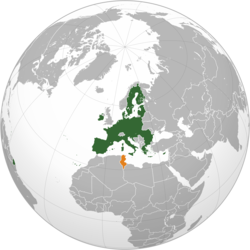 | |
European Union |
Tunisia |
|---|---|
Tunisia–European Union relations are the foreign relations between the country of Tunisia and the European Union.
Trade
The EU is Tunisia's largest trading partner. More than 75% of Tunisia's exports go to the EU and more than half of Tunisia's imports come from the EU. The total trade in goods between the EU and Tunisia in 2017 amounted to €20.5 billion.
Funding and Assistance
Tunisia receives some of the largest amount of money from the European Neighborhood Instrument out of all the participating countries with a "focus on different sectors such as the economy and the business environment; education, training and research; culture and media; migration and asylum; justice, freedom and security; environment, climate change and energy.". In addition to funding for migrant relief, Tunisia benefits from several other EU funding projects such as the European Instrument for Democracy and Human Rights, Instrument contributing to Stability and Peace, and the Development Cooperation Instrument (DCI). Tunisia is also a member of the Erasmus+ program and an associate member of Horizon 2020. Flows of foreign direct investment to Tunisia are also concentrated on the development of the infrastructure network as well as of the textiles and clothing sectors.
In July 2023, Tunisia and the European Union signed a memorandum of understanding to boost economic partnership and reduce immigration from Tunisia to Europe. In September it was announced that as part of the agreement a payment of 127 million euros would be disbursed to Tunisia. A month later however, Tunisia returned 60 million euros back to the EU due to disagreements over the deal.
The European Commission is withholding findings from a human rights inquiry into Tunisia, raising concerns over transparency in relation to a controversial EU-Tunisia migration deal amid ongoing reports of abuses against migrants.
Chronology of relations with the EU
| Date | Event |
|---|---|
| 1976 | The European Economic Community formally starts working diplomatic relations with Tunisia. |
| 1995 | An Association Agreement is signed between the EU and Tunisia. |
| 14 July 1998 | The first meeting of the EU-Tunisia Association Council is held. |
| 2012 | A Privileged Partnership is established following the aftermath of the Tunisian Revolution. Since 2011, EU assistance to Tunisia has increased dramatically. |
| 3 March 2014 | The EU and Tunisia establish a Mobility Partnership in response to the migrant crisis, including "simplifying procedures for granting visas". |
| 13 October 2015 | Negotiations for a Deep and Comprehensive Free Trade Area (DCFTA) between the EU and Tunisia begin. |
| 29 September 2016 | The EU issues a Joint Communication Strengthening EU support for Tunisia. |
| 1 December 2016 | The European Union and Tunisia launch the EU-Tunisia Youth Partnership. |
| 16 July 2023 | The EU and Tunisia sign a Memorandum of Understanding on a strategic and global partnership. |
References
- Although there has been a large degree of integration between European Union member states, foreign relations is still a largely intergovernmental matter, with the 28 members controlling their own relations to a large degree. However, with the Union holding more weight as a single bloc, there are at times attempts to speak with one voice, notably on trade and energy matters. The High Representative of the Union for Foreign Affairs and Security Policy personifies this role.
- "Tunisia". European Commission. 14 January 2020. Retrieved 9 March 2020.
- "Tunisia". European Commission - European Neighborhood Policy and Enlargement Negotiations. 17 December 2019. Retrieved 9 March 2020.
- Johansson-Nogués, Elisabeth; Escartin, Adrià Rivera (2020-07-22). "Supporting the Tunisian transition? Analysing (in)consistencies in EU democracy assistance with a tripartite nexus model". Democratization. 27 (8): 1376–1393. doi:10.1080/13510347.2020.1792886. hdl:10230/46589. ISSN 1351-0347.
- "Tunisia". European Commission - European Neighborhood Policy and Enlargement Negotiations. 17 December 2019. Retrieved 9 March 2020.
- "Tunisia". European Commission. 14 January 2020. Retrieved 9 March 2020.
- ^ "Press corner". European Commission press corner - Memorandum of Understanding on a strategic and global partnership between the European Union and Tunisia. Retrieved 2024-03-17.
- "Commission announces almost €127 million in support of the implementation of the Memorandum of Understanding with Tunisia and in line with the 10-point plan for Lampedusa". European Neighbourhood Policy and Enlargement Negotiations. 16 July 2023. Retrieved 10 April 2024.
- "Tunisia hands back €60M of EU funding as migrant deal tensions soar". Politico. 11 October 2023. Retrieved 10 April 2024.
- Townsend, Mark (23 October 2024). "EU refuses to publish findings of Tunisia human rights inquiry". Guardian. Retrieved 24 October 2024.
- "Tunisia". European Commission - European Neighborhood Policy and Enlargement Negotiations. 17 December 2019. Retrieved 9 March 2020.
- "EURO-MEDITERRANEAN AGREEMENT". Official Journal of the European Communities. 30 March 1998. Retrieved 9 March 2020.
- "FIRST MEETING OF THE EU-TUNISIA ASSOCIATION COUNCIL". European Commission. 14 July 1998. Retrieved 9 March 2020.
- "Tunisia". European Commission - European Neighborhood Policy and Enlargement Negotiations. 17 December 2019. Retrieved 9 March 2020.
- "EU and Tunisia establish their Mobility Partnership". European Commission. 3 March 2014. Retrieved 9 March 2020.
- "Tunisia". European Commission. 14 January 2020. Retrieved 9 March 2020.
- "EU – Tunisia Joint Communication". European Union External Action. 29 September 2016. Retrieved 9 March 2020.
- "The European Union and Tunisia launch the EU-Tunisia Youth Partnership". European Union External Action. 1 December 2016. Retrieved 9 March 2020.
| Africa |  | |
|---|---|---|
| Americas | ||
| Asia | ||
| Europe | ||
| Related topics | ||
| Tunisian Ministry of Foreign Affairs | ||